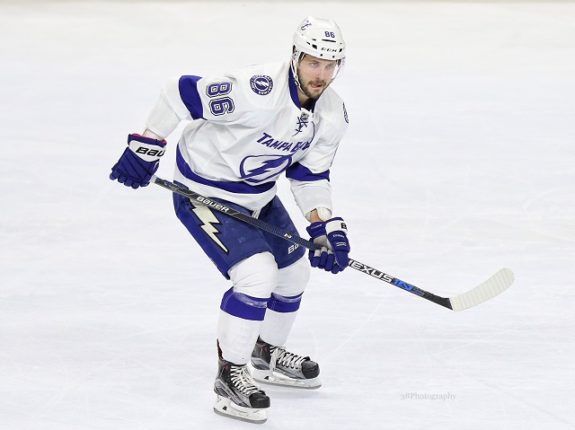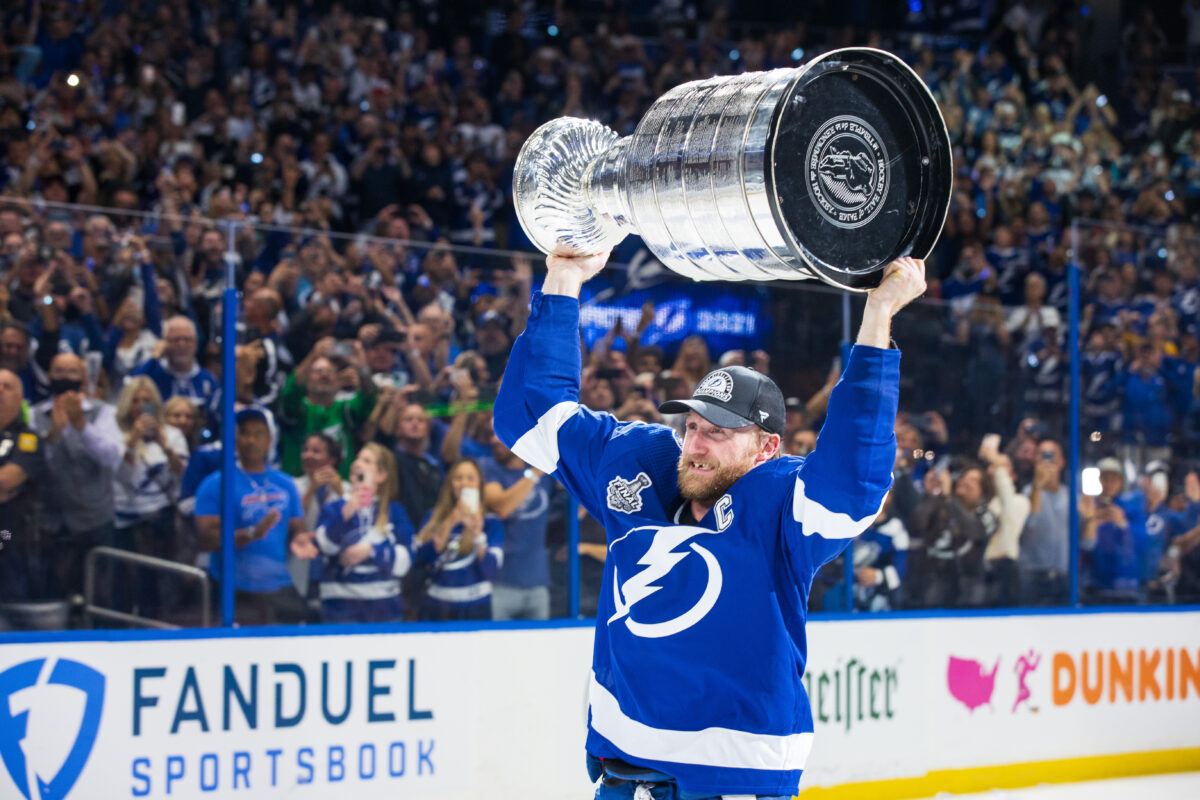The Tampa Bay Lightning repeated as Stanley Cup champions with a series-clinching 1-0 victory over the Montreal Canadiens on Wednesday. Their roster features an astonishing assembly of offensive star power up front, one of the top defense groups in the NHL, and arguably the game’s best goaltender.
The legitimacy of Tampa’s 2021 Stanley Cup has been questioned by some fans, particularly following comments made by defenseman Dougie Hamilton of the Carolina Hurricanes after his team was eliminated by the Lightning in the second round of the postseason. Hamilton’s frustration led him to claim that Carolina “lost to a team that’s $18 million over the cap,” in reference to the growing issue of cap circumvention that has drastically increased around the NHL. However, murmurs of illegitimacy undermine the superb execution by one of the league’s premier organizations.
Kucherov at the Center of Controversy
Lightning winger Nikita Kucherov missed all of the 2020-21 regular season, recovering from hip surgery in December. Management placed him on long-term injured reserve (LTIR) until the beginning of the playoffs, which prevented his $9.5 million annual salary from counting against the cap. That flexibility allowed general manager Julien BriseBois to acquire defenseman David Savard from the Columbus Blue Jackets midseason. On his return, Kucherov hit the ground running and became the leading scorer in the Stanley Cup Playoffs.

Hamilton followed up his statement with an attempt to give the Lightning credit, but his criticism of the situation was inherently flawed. He stated: “If you think about how many more players you could have with the money, you realize how much deeper you’d be.” The notion belittles the outstanding collection of talent assembled by Tampa Bay and ignores the fact that the same rules apply to all NHL teams.
According to The Athletic, Hamilton’s $18 million estimate is exaggerated because it includes players on LTIR who never appeared in the postseason (from ‘Hurricanes’ Dougie Hamilton on Lightning: ‘We lost to a team $18M over the cap,” The Athletic, 6/11/21). Kucherov’s return was the only real difference, and skeptics who claim that he was held out longer than necessary to fit under the cap for the playoffs are in direct conflict with deputy commissioner Bill Daly’s statement that the team handled the situation with proper integrity regarding league rules.
Tampa Bay Lightning: Back-to-Back Stanley Cup Seasons
The Lightning selected center Steven Stamkos with the first-overall pick in the 2008 NHL Entry Draft. They chose defenseman Victor Hedman second overall in 2009. They stockpiled additional world-class talent during general manager Steve Yzerman’s tenure with the organization from 2010-2018, predominantly through drafting and development.
In the 2011 NHL Entry Draft, Yzerman selected Kucherov in the second round and nabbed forward Ondrej Palat in a seventh-round steal. He made a gutsy choice to select 2021 Conn Smythe-winning goaltender Andrei Vasilevskiy 19th overall in 2012. He also used third-round picks to select wingers Brayden Point and Anthony Cirelli in 2014 and 2015, respectively.

The salary cap was implemented in 2005 mostly to prevent teams in the largest NHL markets from dominating the free agent pool on an annual basis. Tampa Bay’s ability to draft and develop a core capable of winning back-to-back Stanley Cups is the most impressive organizational accomplishment of the salary cap era, and their progressive rise in a non-traditional hockey market aligned with the NHL’s intentions. Despite that their active roster exceeded the cap during the 2021 Playoffs, they still worked meticulously within the parameters of NHL rules.
Their ability to earn a postseason bid without Kucherov, arguably their best player, before they exceeded the salary cap, speaks volumes about their organizational depth. A postseason berth is no simple achievement, evidenced by teams like the Dallas Stars, Philadelphia Flyers, and Calgary Flames that missed the postseason despite their talented rosters and high expectations in 2020-21. The likelihood of any other NHL team losing a player of Kucherov’s talent for the entire regular season and still reaching the postseason is not high.
Salary Cap Circumvention
Manipulating the cap in your best interest is not a new concept. Most notably, the Chicago Blackhawks placed winger Patrick Kane on LTIR and freed up roughly $6.3 million in cap space for GM Stan Bowman at the 2015 trade deadline knowing that Kane would likely return for the playoffs. Frank Seravalli, formerly of TSN Canada, wrote of St. Louis Blues GM Doug Armstrong’s similar strategy in 2016, saying, “He played within the spirit of the rules during an era when competitors look for every available circumvention avenue.” According to The Athletic, seven other NHL teams also went over $85 million in total salary during the 2021 Playoffs (from, ‘Hurricanes’ Dougie Hamilton on Lightning: ‘We lost to a team $18M over the cap,” The Athletic, 6/11/21).
Strong cases can be made that the salary cap regulations need to be adjusted to align more closely with the foundational purposes of the cap limit. Any adjustments would spark another evolution in NHL team building, which the Lightning have perfected on their way to consecutive Stanley Cups.